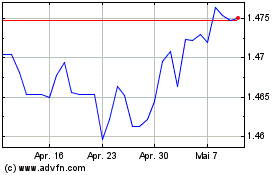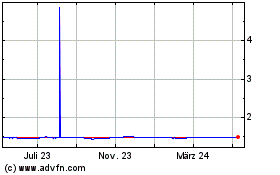Canadian Dollar Falls As Oil Prices Drop
01 Juli 2015 - 8:28AM
RTTF2
The Canadian dollar continued to be weaker against most major
currencies in the Asian session on Wednesday, as oil prices dropped
amid risk aversion after cash-strapped Greece became the only
developed country ever to fall into default missing a 1.6 billion
euro payment to the International Monetary Fund overnight.
Crude oil for August delivery are currently down $0.73 to $58.74
a barrel.
The Greek crisis worsened, with the debt laden nation missing
its EUR 1.6 billion loan payment to the International Monetary
Fund, as the Eurogroup earlier rejected any bailout extension in
spite of the European Central Bank's decision to hold a meeting to
review the emergency funding assistance.
In last minute efforts, the Greek government submitted a request
for a two-year bailout with the European Stability Mechanism (ESM)
to fully cover its financing needs, along with debt restructuring,
the state-backed ANA-MPA news agency reported citing a statement
from the office of the Prime Minister Alexis Tsipras.
The ECB is set to hold a Governing Council meeting on Wednesday
to review the emergency funding assistance to Greek banks. The
lender had refused to raise the cap of its emergency liquidity
assistance on Sunday as the Eurogroup rejected any bailout
extension a day earlier
The oil supply by the Organization of the Petroleum Exporting
Countries or OPEC was increased, due to higher output from Iraq and
Saudi Arabia.
The deadline on talks between Iran and the western powers on
Iran's nuclear program was extended by a week to July 7. An
agreement could have seen sanctions on Tehran withdrawn, enabling a
massive flow of Iranian oil into the global markets. This could
create a supply glut scenario and possibly bringing oil prices down
drastically.
The American Petroleum Institute said in a weekly report
released late Tuesday that U.S. crude stockpiles rose 1.9 million
barrels in the week to June 26. While, the markets expected a drop
of 2 million barrels.
The U.S. Energy Information Administration is set to release its
weekly oil report later in the day.
Sentiment towards the loonie was also dampened by the Canadian
GDP contracting for the fifth straight month.
Statistics Canada reported Tuesday that Canadian GDP for April
fell by 0.1 percent in April following the decline of 0.2 percent
in March. Economists expected an increase of 0.1 percent.
Tuesday, the Canadian dollar fell 0.70 percent against the U.S.
dollar, 0.77 percent against the yen, 0.01 percent against the euro
and 0.97 percent against the Australian dollar.
In the Asian trading now, the Canadian dollar fell to nearly a
4-week low of 1.2502 against the U.S. dollar, from yesterday's
closing value of 1.2487. The loonie may test support near the 1.27
region.
Against the euro and the yen, the loonie edged down to 1.3924
and 97.94 from yesterday's closing quotes of 1.3910 and 98.00,
respectively. If the loonie extends its downtrend, it is likely to
find support around 1.42 against the euro and 96.00 against the
yen.
Looking ahead, final June PMI reports for major European
economies are due to be released in the European session.
At 5:30 am ET, the Bank of England will publish the financial
stability report followed by Governor Mark Carney's news
conference, in London.
In the New York session, U.S. manufacturing PMI reports for
June, U.S. construction spending for May and weekly U.S. oil
inventories report are slated for release.
Euro vs CAD (FX:EURCAD)
Forex Chart
Von Mär 2024 bis Apr 2024

Euro vs CAD (FX:EURCAD)
Forex Chart
Von Apr 2023 bis Apr 2024
